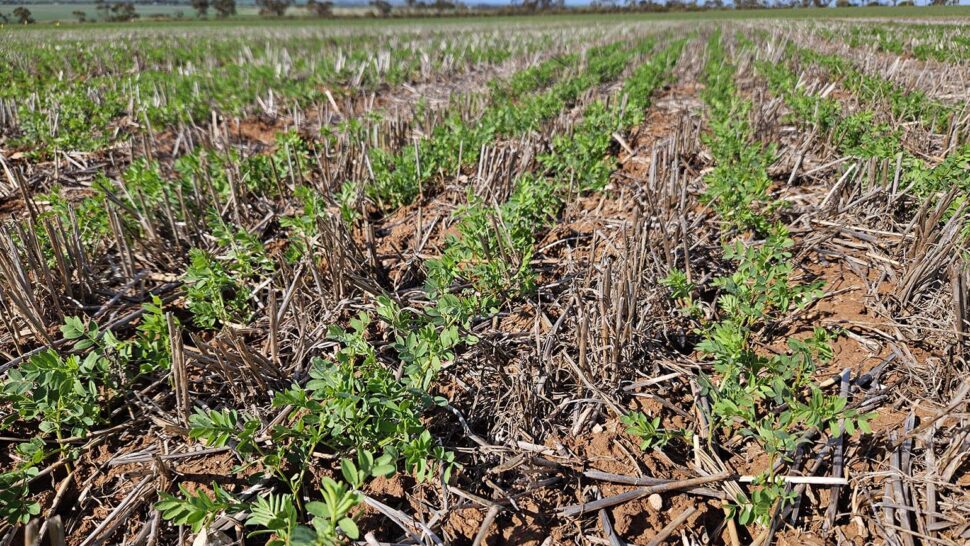The Soil CRC’s ‘Evaluation of innovative microbial carrier products’ project (3.4.002) brings together 2 universities and 4 farmer groups to develop new organic carriers for rhizobial inoculants. Currently, rhizobial inoculants predominantly use peat-based carriers for their distribution, but this is a non-renewable resource and can also be problematic in its handling and effectiveness.
The aim is to evaluate the effectiveness of selected novel inoculant carriers in enhancing nodule formation, nitrogen fixation, and crop yield in field conditions, and to develop cost-effective delivery of rhizobia under different agro-ecological conditions to improve grain legume and pasture legume production in Australia.
Led by Professor Chengrong Chen and Dr Yunying Fang from Griffith University, the project builds on previous Soil CRC research (3.4.001) that assessed 100 potential organic rhizobial carriers and identified and developed the best 4 formulations – mill-mud-based, biochar-based, diatomite-based and cow manure-based.
Under laboratory conditions, these formulations had higher rhizobial survival rates, nodulation and drought resistance than the commercially available peat inoculants (in addition to being a non-renewable resource, peat often has a low rhizobial survival rate in soil or coated seeds when placed under environmental stresses such as heat or drought).
Soil CRC PhD graduate Dr Rahat Shabir is part of the Griffith University team leading the project and said the current research involves the manufacturing of these novel formulations for seed coating and granular products.
“These products are made from locally sourced, cost-effective, renewable, and environmentally friendly materials,” Dr Shabir explained.
“Organic carriers are rich in nutrients and provide excellent habitat for rhizobia which can support rhizobial growth and survival in the soil.”
A large-scale pot trial for soybeans is using soils from different regions and agroecological conditions across Australia, with 2 different moisture treatments. At the same time, 4 field trials are underway—a lentil crop trial with Hart Field Site Group in South Australia, a chickpea trial with Central West Farming Systems (CWFS) in New South Wales, a field pea trial with WANTFA in Western Australia, and a soybean trial with Burdekin Productivity Services in Queensland.
Large-scale pot trial at Griffith University
The project team established a glasshouse experiment at Griffith University. Mill-mud-based, biochar-based, diatomite-based and cow manure-based formulations were used as treatments, and controls such as soil only (no inoculant), a peat inoculant and a commercial inoculant were also included for comparison.
The soils were sourced from four different locations across Australia—Rocky Point (Qld), Clare (SA), Burdekin (Qld) and Condobolin (NSW)—and two watering regimes were maintained: 55% and 30% water holding capacity.
“Compared to controls (uninoculated control, peat inoculant and the commercial inoculant), the mill-mud, biochar, diatomite, and cow manure-based formulations significantly increased plant growth attributes, including shoot/root dry biomass, root length, number of nodules and number of pods,” Dr Shabir said.
“In particular, the mill-mud formulation showed the most significant effects on improving plant attributes across watering regimes and soil types.
“Our glasshouse trials suggested the great commercialisation potential of the developed microbial carrier products, particularly the mill mud-based formulation.”
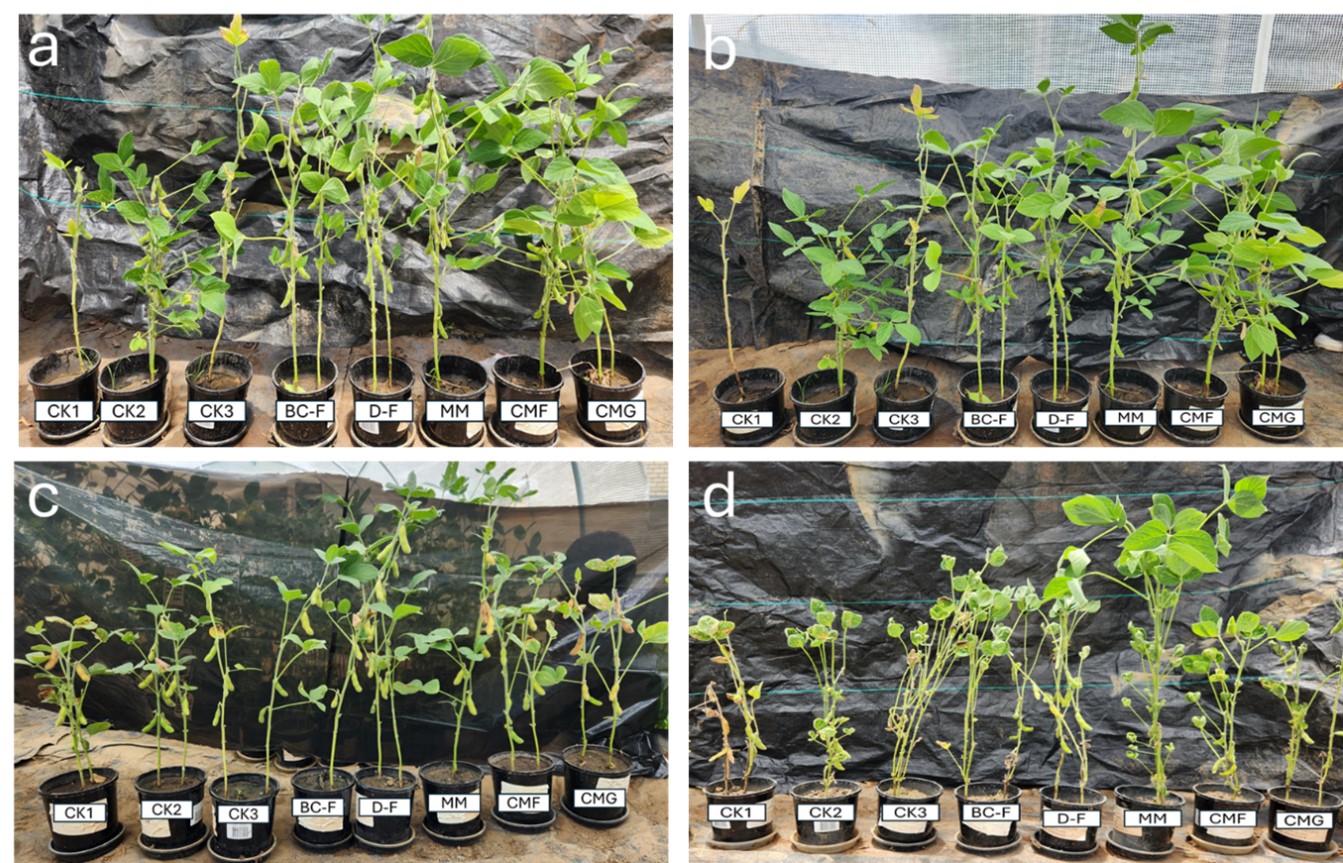
Chickpea crop trial in New South Wales
A chickpea field trial commenced in May 2024 at Condobolin, NSW, featuring nine different treatments. The site was harvested in November.
“The results so far are very encouraging. Nodule scores were recorded at the flowering stage of chickpea plants, with preliminary results revealing that all our inoculant products (mill-mud-based, biochar-based, diatomite-based, and cow manure-based) had good nodulation scores (>20),” Dr Shabir said.
A nodulation score of 20-25 is considered an effective nodulation (good potential for nitrogen fixation). Among the seed coating inoculants, the diatomite-based inoculant showed an improved nodulation score (22) compared to other treatments.
Likewise, the cow manure granular product also showed a good nodule score (20.25). The mill-mud and diatomite-based formulations performed better for crop yield and harvest index.
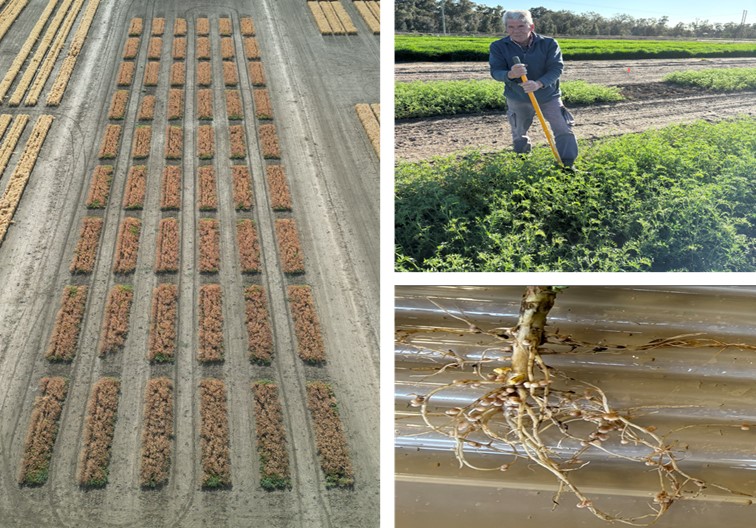
Lentil crop trial in South Australia
The lentil microbial carriers trial was sown at Hart Field Site near Clare in SA on 13 June 2024, emerging approximately two weeks later. Below-average rainfall in early spring significantly impacted productivity potential, with hot, dry days resulting in poor lentil seed set across all treatments.
Extremely dry soil throughout most of the growing season impacted sampling ability, as soil strength caused root breakage at sampling. Grain yield and 1000 grain weight were the only data collected from the 2024 trial, with severe drought conditions preventing further data collection.
There was no significant effect of treatment to yield or 1000 grain weight in 2024.
The project team are planning to start a new lentil field trial later this year, subject to favourable weather conditions in South Australia.
Field pea crop trial in Western Australia
The field pea trial at the WANTFA site started in June 2024 and was harvested in November the same year.
Dr Shabir said the nodule score results indicated that among the seed coating products, the mill-mud-based formulation performed better than other treatments, showing a 36% increase in nodule score compared to the peat inoculants.
“The yield and plant biomass results showed that biochar-based and diatomite-based formulations were superior to other treatments and exhibited a 16% and 11% increase in plant biomass compared to the uninoculated control, respectively,” he said.
“Similarly, a 20% increase in yield was shown by the biochar-based formulation compared to the control, and the diatomite-based formulation showed a 16% increase in yield compared to the control.
“Our granular product (cow manure granular) also showed good results compared to the commercial granular product, showing a 34% increase in nodule score.”
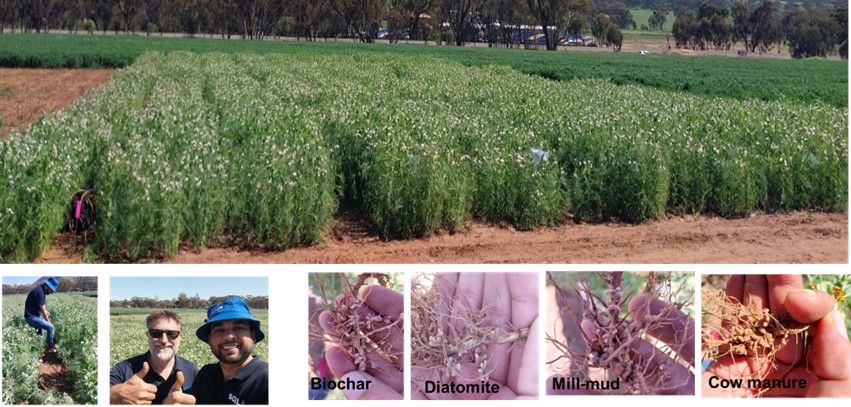
Soybean crop trial in Queensland
The soybean crop at Burdekin Productivity Services was sown in January 2025. The block was irrigated to maintain soil moisture, then 60mm of rain fell on the paddock (storms were predicted 4 days later).
Heatwave conditions followed, and the seeds were swollen before appearing to stew in the extra moisture from the rain and heat. Another 200mm of rain then washed the trial out before the emergence of seedlings.
The project team plans to restart the trial in July this year. It will run during the dry season, when rain is less likely to impact the site.
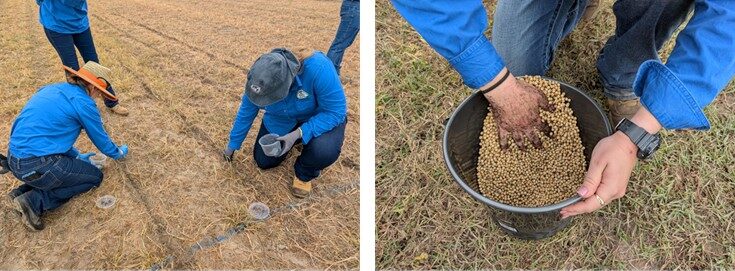
Next steps
- The project team is working with industry partners to improve the quality of inoculant products and prepare them for potential commercialisation.
- A new soybean field trial will start with Burdekin Productivity Services, Queensland in July 2025.
- The shelf life of inoculant products will be determined up to one year.
- Detailed results from each field and glasshouse trial will be provided early next year.
The project is on track to wrap up in 2026.
Project participants
- Griffith University
- Central West Farming Systems
- University of Newcastle
- Hart Field Site Group Inc.
- Burdekin Productivity Services
- WANTFA
Acknowledgement
The key inoculant strains were kindly provided by the Australian Inoculants Research Group (AIRG), NSW Department of Primary Industries and Regional Development.

